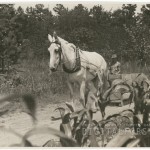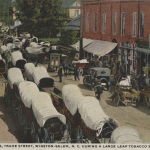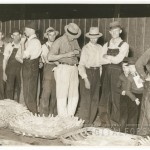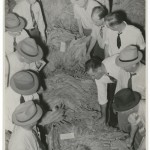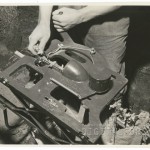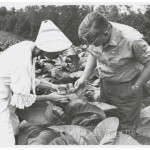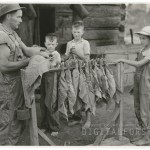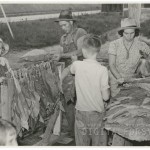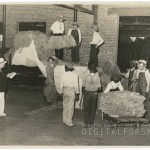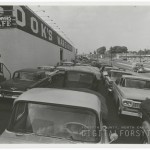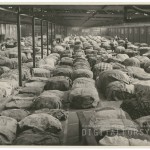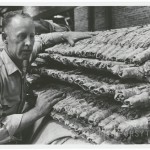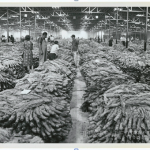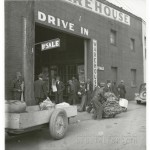The Street Built on Tobacco
Today galleries, restaurants and shops line Trade Street but in its heydey Trade Street was the center of the tobacco market. Tobacco warehouses drew farmers, auctioneers and buyers into this area that we now think of as the artsy district of downtown. These photos from Digital Forsyth, the Forsyth County Library website, Forsyth County Library website show a glimpse of what Trade Street was like between the 1930s-1960s.
The auction season typically lasted about sixty days. The auctions began at the end of summer in August. In the auction heydey there were over fifty auctions happening simultaneously each day in the south from North Carolina down to Florida.
“For most of the last century August created a special stir and air of excitement for local tobacco farmers as the leaf auctions opened. It was an annual late summer ritual. The streets of Winston-Salem and many other communities throughout the southeast were filled with the sweet perfumed aroma of the golden leaf, ” said Doug Grimes, former tobacco buyer.
Grimes was “knee deep” in the industry before he retired according to Wisnton-Salem resident Bowman Gray. Grimes worked for R.J. Reynolds Tobacco Co. and Brown & Williamson as a buyer. He traveled throughout the south and abroad to places as far as Zimbabwe purchasing tobacco. Winston Salem was one of his destinations.
The auction houses were the center of business in Winston Salem. In the early days of the auction houses in the 1920s farmers would travel to Trade Street in the on horseback to sell their tobacco.
“My father was an auctioneer, I had a brother who was an auctioneer but that’s all I heard all my life. And all around this community people were affiliated in one way or the other with the tobacco business,” said former auctioneer, Page Roberts.
Roberts remembers Winston as a bustling center for tobacco trade. “Sometimes when the tobacco was coming in really fast we would have trucks lined up in front (of the warehouse) and they would be there sometimes for hours.”
During Roberts career in the auctioneering business, there were twelve major auction houses in the area where sellers would come to sell their tobacco to the major companies, most namely R.J. Reynolds Tobacco Co.
Today, there are few auction houses left in North Carolina as many farmers have fixed contracts with major tobacco companies. Old Belt Tobacco Sales auction house in Rural Hall, N.C. still has auctions every Tuesday where the tradition stays alive.
“The auction system provides more opportunities to the farmers by having four to five buying companies bidding on and purchasing their tobacco as opposed to one large company purchasing the tobacco at a set price,” said Dennis White, current auctioneer at Old Belt Tobacco Sales in Rural Hall, N.C.
- Horse pulling tobacco farmer through field.
- Trade Street in 1922 busy with incoming tobacco traffic.
- Men waiting for the tobacco auction to start.
- Observing Tobacco at the auction.
- Processing the tobacco at the auction house with a manual machine.
- Husband and wife in the tobacco field.
- Family preparing tobacco.
- Family at work preparing for the tobacco auctions.
- Loading the trucks for the tobacco auction.
- Traffic near the tobacco warehouse.
- Inside of a tobacco warehouse before an auction.
- Preparing for the beginning of the auction.
- Start of an auction.
- 804 N Trade Street Tobacco Warehouse
